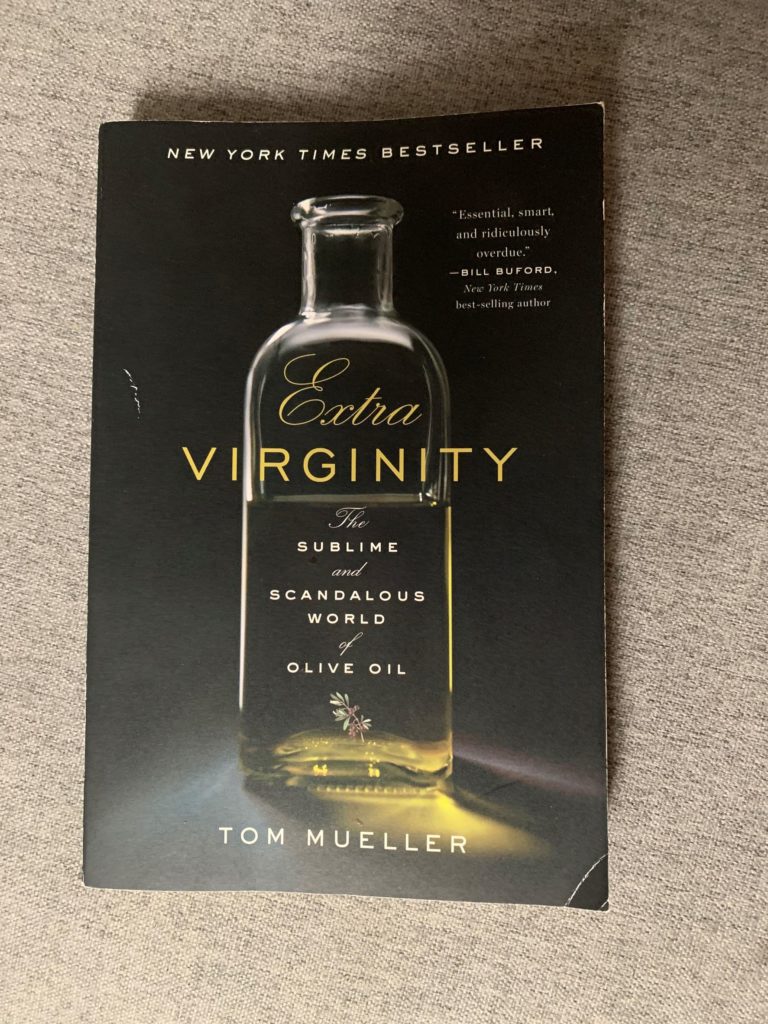I have been taking my time with this one. It was the September 2021 selection for the Left Coast Culinary Book Club. As part of our gettogether, we did olive oil tasting and made dishes where olive oil was the main or standout component. In contrast to the August selection, I was fascinated with this one. I had some high level knowledge of the problems with the industry but this book really gets into the ring with them.
The book starts out with the historical references to olive oil in lore such as in Homer’s Odyssey, to the growth of culture via the Mediterranean people, it’s historical uses and importance to society. Then it travels into the scandalous world and wanders around into the new world and the push for a cleaner industry.
I have to say, this is definitely a fascinating book. Apparently, the Romans developed a welfare system whereby olive oil was distributed to the population. As a result, one entire hill in Rome is the remnants of the clay vessels that were cast aside when empty. In another fact, oil was stored in basements under buildings and when the cities were invaded and burned, so did the oil. Apparently, that act is what preserved writing on clay tablets by making them hard.

I never realized that there was a distinction in culture between the olive eating culture and the animal fat culture. That line was precisely where olive trees stopped growing. This section gets into the politics of propaganda and the regional developed tastes by proximity to the raw ingredients.
The book talks about how olive oil is made, all grades. It talks about the economics of olive growing and the distribution industry. It talks about the chemistry of olive oil, why it is good and what is wrong with the industry. It is something that I never thought I was that interested in and makes me want to consider doing something in that field.
If you are to believe the book, and I do then I think it is a forgone conclusion that nearly all oil that the non-Mediterranean person can obtain is poor quality at least and likely adulterated with other oils. That in of itself is not the end of the world, but it does mean that there are less associated benefits to that type of oil. What makes it special are the anti-oxidants present in the oil which rapidly degrade and make it equivalent to all the other oils out there.
On that note, the more flavors present the more likely it is fresh. So, if you taste the oil and it has some life in it, then it is more likely it is a good one. According to the book, over fifty percent of the oil in this country is not pure extra virgin and that was ten years ago. In contrast, over 90% of the European oils are not pure. It was also noted that nearly every oil at the supermarket this was the case as well as being rancid.
I am not sure what to do at this point. For sure, I am not going to dump what I already have. According to figures in the book, it costs 9 euros per liter to produce. With mark-up (and conversion), I would expect $20/quart is a bare minimum number to be looking for the real stuff. I will be keeping an eye out for a better solution and product. Most likely, the best way to get fresh and quality is to buy direct from the source. Look for single source producers in the US or Australia. There are additional resources in the book.
End Your Programming Routine: Hopefully my exuberance came through, I thoroughly enjoyed the book. The characters are complicated: rich one day and convicts the next. Government comes off as impartial yet graft runs amok. Everyone knows a little to a lot but no one is willing to speak on total authority as it is always the other guy. If you are interested in food, history, true crime or just something different, I would recommend this book.
Recent Comments